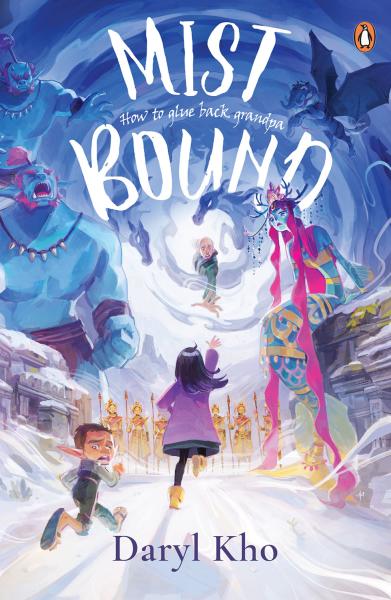Mist-Bound: How to Glue Back Grandpa
By Daryl Kho
HABA2022 Middle-grade Book Category Winner
Can a girl, armed only with stories, make her way through a land of myth, magic and monsters, to save her grandfather's shattered memories before they're forever lost?
His only cure? Memory Glue. To brew it, Alexis just needs eight ingredients: stuff like nose hair from a baku (dream-eater), sweat from a duyung (sea siren) and...OK. Maybe some are tricky to find in local supermarkets.
To obtain them Alexis must journey to a realm where the fabled creatures from Grandpa's folktales are alive in the flesh (and often flesh-eating).
At least she'll have fun company: the nasty kenit (forest imp) who'd cast the horrible spell on Grandpa, and her no-nonsense Grandma, who harbours a secret that'll change Alexis' life forever.
Piece of cake, right?
Oh, there's also a deadline.
Can Grandpa be saved before he's forever lost to the mists within his mind?
Based on a true story.

Daryl Kho
Malaysia-born and Singapore-based, Daryl Kho is the author of Mist-Bound: How to Glue Back Grandpa, a fantasy novel for families published by Penguin Books SEA. Inspired by his family’s experiences, the book aims to raise dementia awareness and appreciation for the elderly as well as for the power of stories. It aspires to stir interest in especially the tales that can be found in our own backyards and in the minds of our elders. More info on Daryl and his book can be found at darylkho.com
Feature Interview
Mist-Bound: How to Glue Back Grandpa is a book about family, for families, and as author Daryl Kho tells us, it is a book he wrote to arrange a meeting between his daughter and her grandfather, for her to meet him like how they all knew him, full of laughter and stories. Daryl also walks us through the
Dementia and its impact is a difficult topic to write about. Why did you choose to portray dementia through the lens of an adventure story?
To be honest, I didn't set out trying to write a “how-to-understand-dementia-book” at all. My dad got vascular dementia from a series of strokes that he suffered, and this happened just three months before my daughter was born. A big regret was that the two of them just missed each other and never really got to meet. And so, this book was my way of arranging that meeting, at least on paper.
I started out just wanting to write a book for my daughter, one that was like a paper bottle of memories. A paper bottle that could capture how my dad was like, for her to meet him as the father that I knew before he became the sick grandfather that she knew him as after dementia. On one side of the coin, full of laughter, stories and wisdom, and then the other side after dementia, just a pale shadow of his former self, a shell really. I wanted her to feel that sense of loss from seeing someone so full of life and stories suddenly have that taken away.
Secondly, a paper bottle that could also capture how amazingly strong and selfless and full of love my mother, her grandmother was, being there for her husband, for my father through his worst and through his lowest. She was in fact, the hero of our family story.
I wanted to take this essence of grandpa and grandma and put them into this little paper bottle for my daughter, something that she can then take with for the rest of her life and pass on to her kids. And in that way, kind of keep them both alive forever.
Last, but not least, when my dad was first struck with his stroke, it was a really tough time for my family, and the only thing we had to look forward to was my daughter's birth. When she came along, it felt like the end of winter, and the start of something new. Even my dad's condition started improving. At that time, it was really nice to think that in a way, she was his cure.
I really wanted this paper bottle to capture that concept, too. So when my inspiration for the book struck, everything just came together at the right time. I used to read a bedtime story to my daughter and at that time, the stories that she enjoyed were fantasy adventure stories like The Faraway Tree When my aha! moment came, it went like this: I'm gonna write a book for my daughter, her very own bedtime story, one where she's the heroine, and it will be a quest to save her grandfather, to find a cure for his memories, and she will go on an adventure with her grandmother to both save grandpa together. Along the way, Alexis will discover how amazing her grandmother is, because in real life, the two of them aren't as close as I’d love because of distance. I guess you could say in this book as Alexis searches for the flower, she's actually going on a journey to find herself, literally and figuratively.
Dementia is the flame that's actively burning through those shelves while they're standing and those stories on the shelves are turning to ash right before your very eyes.
What is one thing you hope that children will be able to take away from Mist Bound?
There's this quote I came across when I was a kid and it stuck with me through my life. It served as my North Star for me as I wrote the book, a lighthouse, if you will. This quote by Amadou Hampâté Bâ, “when an old person dies, a library burns to the ground” can be found at the front of my book that prefaces the story, right before the story begins.
That imagery helped build the four walls around my lighthouse, my core themes, or key takeaways. The first wall is appreciation for elders, especially our grandparents, as they are living libraries filled with knowledge, wisdom and stories. I wanted my readers to go borrow the books from the libraries of their grandparents’ minds before they're gone.
The second wall is awareness about dementia. When they pass away, these libraries burn down. Dementia is the flame that's actively burning through those shelves while they're standing and those stories on the shelves are turning to ash right before your very eyes.
The third wall is the appreciation for stories, with an emphasis on Asian stories. Stories are what helps the heroine overcome a lot of the obstacles and challenges that she faces, and stories are a way for us to deal with a world that doesn't always make sense. I wanted to inspire readers to seek those stories and myths not just from their grandparents' minds, but also our own backyards—Asian stories. When writing this book, I realised I knew more about Western myths than local ones, so I wanted my readers to be inspired to go and seek out those cool mythical creatures and folktales around us.
Last but not least, the fourth wall, which is the importance of family. Just going back to the metaphor of the library on fire, when a building is on fire, you typically run away from the building. However when your building's on fire, family are the people who run in when everyone else is running away. Despite all the various funky magical ingredients that make up memory glue, it's really the bonds of family that are the real glue in memory glue. Family is what keeps us glued together even when our own minds become unglued when everything is falling apart. So when everything fades into the mist, all that remains is family. And that I think is a very one of the key messages of this.
(Coincidentally on this year’s AFCC website, there is a lighthouse!)
Stories are what helps the heroine overcome a lot of the obstacles and challenges that she faces, and stories are a way for us to deal with a world that doesn't always make sense.
Tell us more about the choice to incorporate Southeast Asian elements, prehaps the kind of research you did or how you made the choice to incorporate this over that.
I wanted a smoke horse because that was my father's favourite animal. Smoke horse also because another theme was obviously memory, and him losing it was a fire. I searched around trying to find a smoke horse in Asian mythology, and the closest I could find was an enenra (Japanese smoke creature). I just decided to make something up if I couldn’t find it, and so I made a smoke horse. The kudera is a combination of kuda and enenra. So that became my smoke horse or my nightmare, so to speak.
Another idea I first had was when my dad was still somewhat lucid. I ran downstairs and I told him, “I'm going to write a story about how his granddaughter would go on a quest to find memory glue to glue his memories back together and save him”. He laughed and said, "Well, there needs to be an elephant in there”, and I was like, “what, why? Because elephant glue is it? You know, glue the memory back?”
But he said, “no, because elephants never forget”.
That stuck with me, and that line appears in the book. I went around looking for an animal that is elephant-like, but it was a bit difficult to fit an elephant in the story, but I found Baku, the Japanese eater of dreams that has the head of an elephant and a body of A body of Tiger, I believe.
Were there any challenges you faced while completing the manuscript for this book?
Being a first time writer of a book, I started out just relying on having the mood or inspiration to write. That got me through the first draft, which I finished in six months. Things just slowed down after that; work and life all took over. My manuscript just sat as a draft for pretty much several years and inspiration rarely visited. I finally realised that I took too long to write this book when my dad passed away. It was a wake up call, I really took too long and I was too late to read it to him like I planned to. That lit a fire under my butt and I decided to take it seriously and treat it like an actual job and finish it for him. I realised that you can't sit around waiting for inspiration to finish a book and you have to actively schedule that meeting. It takes discipline and it needs to become a habit, like preparing to run a marathon or trying to lose weight.
It was finally published last year, about six and a half years after I had first had the idea.
Just two weeks ago, I finally managed to make it back to Kuala Lumpur when the borders opened to give my father his copy. His copy sits now next to his urn that holds his ashes, and it meant quite a bit for me to actually finally give that to him. It hit me as I started this book because of my dad's illness, and now I finished it because of his death.
It's like everything came one full circle, right?
Yeah, right exactly where it all began. Ironically, when I was in university. I wanted to actually study English because I really loved writing and my dad, of course, being the traditional Asian parent was like, “hey, you know what, that's not really very practical, writing can't fill your rice bowl, go study something more practical.” He was the one who kind of said, “you know, if you love writing, you can write about whatever lah or go study economics and then go write about finance or stuff like that”. So, ironically, it was him who was my inspiration for writing after that when he fell ill. Yeah, so it came full circle.
On your website, you mentioned Mist Bound as your first family friendly book. Would you continue to write for children?
It's actually my first book, and I only wrote it because of my daughter. I used to write a lot in high school, and in university, I used to write plays and kung fu skits that were basically inspired by those 1980s Hong Kong kung fu shows. We replicated that on stage with choreographed fight scenes, techno music, and voiceover dialogue. But once I graduated, the only things that I wrote were corporate emails, and that lasted for about 15 years. So nothing creative happened.
My daughter came along, and this idea came along. And so this is my first book. I enjoy writing for kids because I never grew up. And you know, I never will, still a Toys “R” Us kid. But I do love this world that I created, and I think it will be a waste to just let it end there. I think a dream would be to continue it as a franchise, or at least start with book two. That would be a dream but it's just a bit difficult with a full time job. I do have another idea for another book or maybe a YA based on my childhood. I do have a short story coming up that should be published in an anthology, the science fiction anthology also targeted at children.
Don’t forget to check out Daryl’s upcoming works!
Check out Mist-bound: how to glue back grandpa at our Festival Bookstore now!
Back to HABA Shortlist

